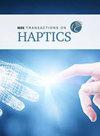时空一致性会调节位移判断中视觉触觉信息的权重。
IF 2.4
3区 计算机科学
Q2 COMPUTER SCIENCE, CYBERNETICS
引用次数: 0
摘要
结合或整合多种感官的信息往往能为感知物体和事件提供更丰富、更可靠的估计。在日常生活中,来自同一来源的感官信息往往在时空上非常接近。这可能是决定多感官信号是否结合以及如何结合的重要因素。先进技术显示系统的引入可以在虚拟环境中呈现多感官信息。然而,由于渲染延迟,技术显示系统可能缺乏真实世界的时空保真度。因此,任何时空不协调都可能改变信息的组合方式。在本研究中,我们通过研究空间和时间上不一致的触觉位移线索是否以及如何补充不精确的视觉位移线索来测试这一点。受试者在空间和时间不一致的条件下,利用视觉和触觉位移线索完成视觉位移任务。我们利用受试者在视觉触觉条件下的表现,模拟了受试者在视觉触觉条件下如何结合视觉和触觉信息。我们发现,时间不一致会导致触觉权重增加,尽管它们与一致条件相关。与此相反,空间不一致会导致个体差异改变线索组合策略。我们的研究结果表明,在进行视觉位移判断时,时空一致性对于结合触觉和视觉线索非常重要。鉴于线索组合策略的改变和个体差异,我们建议开发人员采用个体时空校准程序来提高感官增强的效率。本文章由计算机程序翻译,如有差异,请以英文原文为准。
Spatiotemporal Congruency Modulates Weighting of Visuotactile Information in Displacement Judgments
Combining or integrating information from multiple senses often provides richer and more reliable estimates for the perception of objects and events. In daily life, sensory information from the same source often is in close spatiotemporal proximity. This can be an important determinant of whether and how multisensory signals are combined. The introduction of advanced technical display systems allows to present multisensory information in virtual environments. However, technical displays can lack the spatiotemporal fidelity of the real world due the rendering delays. Thus, any spatiotemporal incongruency could alter how information is combined. In the current study we tested this by investigating if and how spatially and temporally discrepant tactile displacement cues can supplement imprecise visual displacement cues. Participants performed a visual displacement task with visual and tactile displacement cues under spatial and temporal incongruency conditions. We modelled how participants combined visual and tactile information in visuotactile condition using their performance in visual only condition. We found that temporal incongruency lead to an increase in tactile weights although they were correlated with the congruency condition. In contrast, the spatial incongruency led to individual differences altering cue combination strategies. Our results illustrate the importance of spatiotemporal congruency for combining tactile and visual cues when making visual displacement judgments. Given the altered cue combination strategies and individual differences, we recommend developers to adopt individual spatiotemporal calibration procedures to improve the efficiency of the sensory augmentation.
求助全文
通过发布文献求助,成功后即可免费获取论文全文。
去求助
来源期刊

IEEE Transactions on Haptics
COMPUTER SCIENCE, CYBERNETICS-
CiteScore
5.90
自引率
13.80%
发文量
109
审稿时长
>12 weeks
期刊介绍:
IEEE Transactions on Haptics (ToH) is a scholarly archival journal that addresses the science, technology, and applications associated with information acquisition and object manipulation through touch. Haptic interactions relevant to this journal include all aspects of manual exploration and manipulation of objects by humans, machines and interactions between the two, performed in real, virtual, teleoperated or networked environments. Research areas of relevance to this publication include, but are not limited to, the following topics: Human haptic and multi-sensory perception and action, Aspects of motor control that explicitly pertain to human haptics, Haptic interactions via passive or active tools and machines, Devices that sense, enable, or create haptic interactions locally or at a distance, Haptic rendering and its association with graphic and auditory rendering in virtual reality, Algorithms, controls, and dynamics of haptic devices, users, and interactions between the two, Human-machine performance and safety with haptic feedback, Haptics in the context of human-computer interactions, Systems and networks using haptic devices and interactions, including multi-modal feedback, Application of the above, for example in areas such as education, rehabilitation, medicine, computer-aided design, skills training, computer games, driver controls, simulation, and visualization.
 求助内容:
求助内容: 应助结果提醒方式:
应助结果提醒方式:


